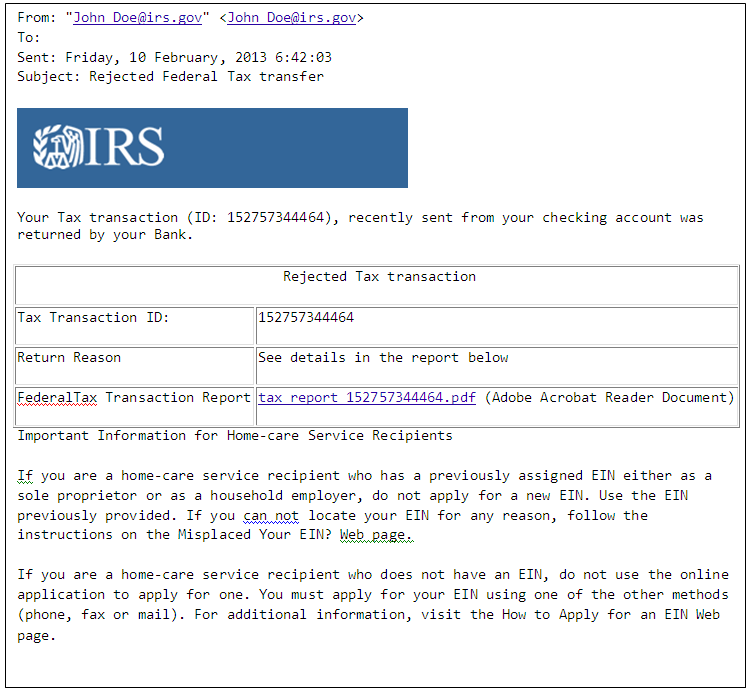March 2013 Tax Time Scam Alert
Tax-themed malicious emails, purporting to be from the IRS or another organization, may once again be showing up in the email boxes of both companies and individuals during tax season. Below is a sample of a phishing email claiming to be from the IRS. Although it may look authentic, it is not.
It is important to note that neither the IRS, nor any other reputable business, will initiate contact with taxpayers by email, text message, or social media channels to request personal or financial information.

As is common with these types of phishing emails, the message indicates that your tax transaction was returned by your bank. Included in the information is a link to a report that will allegedly provide more information on the transaction. If you click on the link in the email to access the report, you will download malware onto your computer, which will then be used to steal your information and money.
The "problems" come in a variety of flavors, including:
- A rejected tax return
- An unaccepted tax payment
- A lost tax payment
- An unapproved tax payment
- A tax payment that was returned by the bank
- A tax payment that was cancelled
- Under-reported or unreported income
- Overpayment of a tax refund
Other unsolicited emails may offer tax services, promise bigger refunds, or offer to pay you to participate in an IRS survey.
It's important to note that the IRS is not the only organization to be misrepresented during tax season. Tax-themed malicious emails, purporting to be from other organizations such as investments firms or financial services companies that may provide tax-related information to their customers, also may be sent to unsuspecting taxpayers at this time of the year.
What should you do if you receive a suspicious email purporting to be from the IRS?
- Do not open any attachments or click on any links in the email.
- Contact the IRS at 1-800-829-1040 to ask them if they are trying to contact you.
- Forward the email to the IRS at phishing@irs.gov before deleting it.
If you receive a suspicious email from another organization, contact the organization directly, using a phone number you know is legitimate, and ask if the organization is trying to contact you.
Tips to help protect you:
- Do not respond to unsolicited emails requesting personal or financial information.
- Do not respond to unsolicited emails promising a refund or payment for participating in a tax-related survey.
- Do not respond to emails threatening consequences for not responding.
- Do not click on links or download attachments in unsolicited emails.
- Be wary of emails with incorrect spelling or grammar or with odd phrasing.
- Be wary of emails that discuss changes to existing tax laws or explanations of new tax laws and have a downloadable attachment.
- Secure your computer – keep anti-virus software, anti-spyware, firewalls, operating systems, and application software up-to-date at all times.
- Surf safely – Do not visit internet sites by clicking on a link to the site in an email, in a blog, or from an advertisement.
- Never send sensitive information in an email.
- Use strong passwords and don't use the same password on multiple sites.
Education is your best defense – know what to look for and what to do. To find out more about how to protect yourself from fraud, visit the Privacy & Security Center at www.53.com/Security.
 Equal Housing Lender
Equal Housing Lender